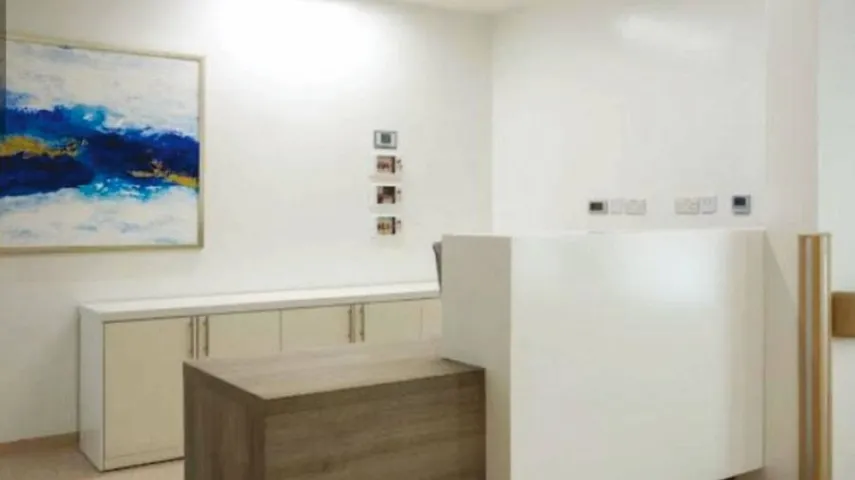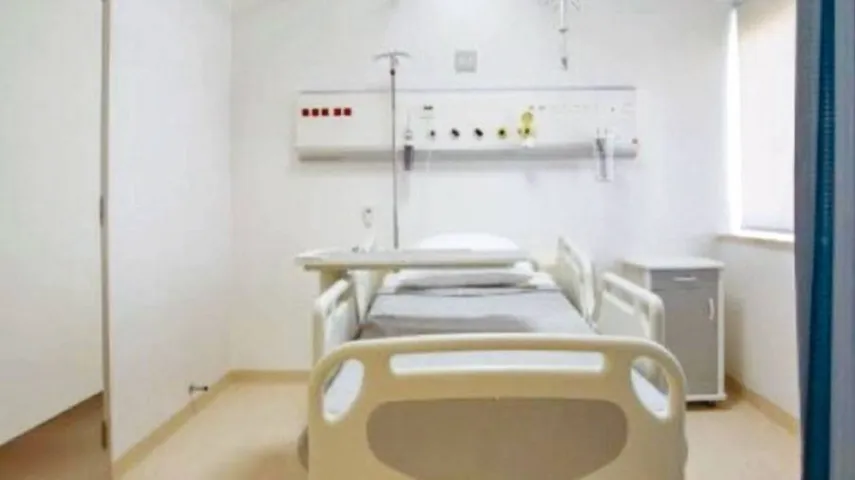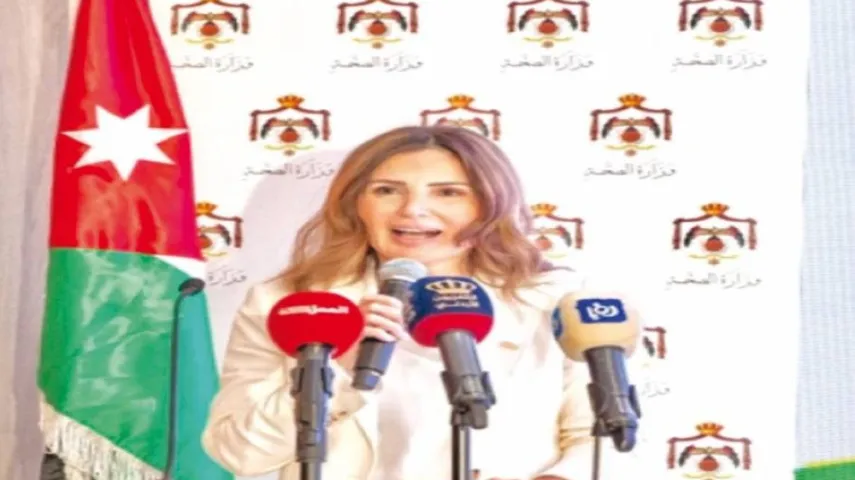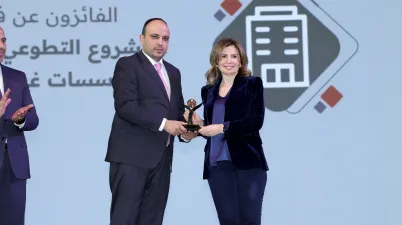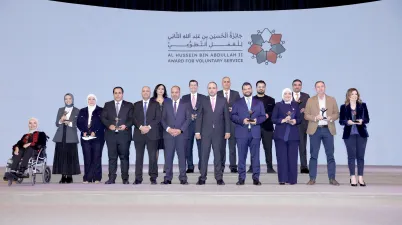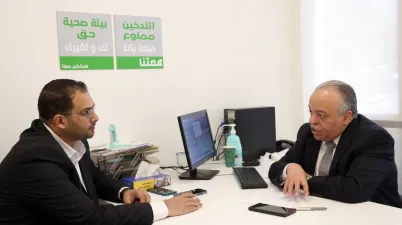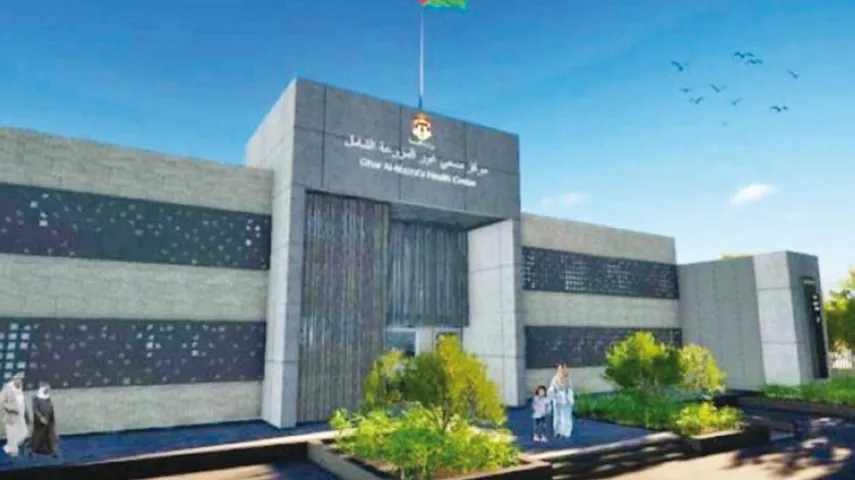
Amman - Dr. Amani Al-Shoubaki
Many questions revolve around the conditions surrounding treatment, the most important of which is: What is the way to improve treatment conditions throughout Jordan in a manner consistent with the right of every patient to receive treatment in a safe and quality health environment through the rehabilitation and development of dilapidated health centers and departments in hospitals and the completion of projects within the highest international health standards, in order to achieve the best comprehensive and integrated health care that meets the needs of patients in a
way that contributes to enhancing the quality of life and its well-being.
The Himmetna Charitable Society, launched in 2019 under the umbrella of the Jordanian Ministry of Social Development, answers this question. It is unique in providing these services, which are considered the first of their kind in the Kingdom.
Himmetna”, founded by Dr. Fadia Fathi Samara, has been able, in a record period “since 2019, to provide more than 500,000 patients with fair and easy access to effective, first-class healthcare services
Not only that, but the Himmetna team works continuously and with voluntary efforts to overcome all obstacles preventing citizens with limited means from obtaining the best medical and therapeutic services.
Project Sustainability
The association is distinguished by its work to ensure sustainability in its projects through redesigning in accordance with the flow of patients and their optimal treatment journey.
Engineering and medical design consider the finest details and the utmost quality. During the project implementation period, the association is developing the capabilities of service providers and workers in the centers by training them in cooperation with specialized and leading institutions so they can provide the best service to the visitors of these centers.
According to the Himmetna roadmap, after the project is opened, the association will follow up on the development steps in the work of the centers and provide practical and technological solutions that contribute to the continuous development of services and improving patient experience.
But what are the projects that the association has accomplished?
Without a doubt, the projects are numerous, the most important of which is a project that focuses on caring for cancer patients. The association launched the Samih Darwazeh Oncology Center project at Al-Bashir Hospitals. The project, which was implemented in two phases, consists of two admission departments and outpatient clinics that provide integrated services for cancer patients. The number of beds in the center reached 46 beds.
The project was completed in record time and transformed into an advanced center equipped with the latest systems and devices, with an aesthetic that benefits the humanity of everyone receiving treatment there and contributes to supporting morale and improving treatment opportunities.
In August 2021, Her Highness Princess Ghida Talal, Chair of the Board of Trustees of the King Hussein Cancer Foundation and Center, signed an agreement with the Jordanian Minister of Health to manage and operate the center.
For the first time in the Kingdom, a distinguished model for cancer patient care was established, in which the efforts and support of the private, government, and civil society sectors were shared, achieving justice and quality for a wide segment of patients.
The second project is concerned with combating infectious diseases and epidemics.
It is a project for the specialized therapeutic isolation and intensive care department in Al Hussein Medical City - Royal Medical Services. With the advent of 2020 and the spread of the Covid-19 pandemic, investing in the healthcare sector and strengthening its systems became the only way out to contain the crisis and preserve the health system from the repercussions of the epidemic. Therefore, the association completed the project for the specialized therapeutic isolation and intensive care department in Al Hussein Medical City with an area of 1200 square meters, which included 18 isolation rooms and service and administrative facilities.
The project was completed during the comprehensive lockdown period during the Covid-19 pandemic in a record time of 60 days, and tens of thousands of patients were treated, and their lives were saved in Rehabilitation and maintenance.
The third project is concerned with primary health care. It is a project to rehabilitate and develop 25 health centers across the Kingdom.
1- Princess Basma Comprehensive Health Center - Al Muhajirin, Ras Al Ain
The association launched the project in early 2022 to develop primary health care and enhance its preventive and therapeutic role, and to enable health centers to respond and combat epidemics, based on the keenness to serve local communities and remote areas, meet people's health needs, and improve services provided to low-income citizens. In addition to providing patients with fair and easy access to effective first-class health care services, which contributes to enhancing the right to health and strengthening community health.
Basma Comprehensive Health Center was the first center to be rehabilitated in 2023 within nine months. It includes departments for maternal and childcare, family medicine, and emergency services around the clock, in addition to clinics specializing in dentistry, orthopedics, ophthalmology, diabetes, and endocrinology, in addition to a medical laboratory and a diagnostic radiology department. The center serves about 250,000 citizens from the surrounding areas and is the first model health center in the Kingdom.
As for the projects under implementation, they include the Ghor Al-Mazraa Comprehensive Health Center, which began operating in 2023. The association has begun working on a project to reconstruct and develop the Ghor Al-Mazraa Comprehensive Health Center in Karak Governorate, which provides services to fifty thousand people from the Ghor Al-Safi area.
The center is of particular importance because it is located in a remote area that lacks adequate health care services. The association found that the building was in danger of collapse and decided to demolish it and rebuild it.
The center is expected to open and start providing services to beneficiaries in
October 2024.
Who is Dr. Fadia Fathi Samara?
Dr. Fadia is a health policy expert and patient rights activist. She holds a Bachelor’s degree in Pharmacy from Jordan University of Science and Technology and has over twenty years of experience in the pharmaceutical sector.
Dr. Fadia is a current member of the Board of Trustees of the Crown Prince Foundation and a former member of the Board of Trustees of the National Center for Human Rights. She has participated in many workshops related to developing the health sector and comprehensive health coverage at the local and regional levels. She has also participated in committees and working groups to develop a roadmap for comprehensive health coverage in Jordan and committees to organize and unify the health sector. She also participated in the Jordan Economic Modernization Vision (Healthcare Sector) workshop launched by the Royal Hashemite Court. She is currently a member representing the local community in the College of Pharmacy Council at the Jordan University of Science and Technology and a member of many institutions and associations concerned with health affairs and women’s empowerment.
Over the past decade, Dr. Fadia has contributed effectively to raising public awareness in the field of health, developing the concept of civil participation in setting health policies, gaining support, and strengthening partnerships between various health stakeholders such as health civil society organizations, the government health care sector, and health institutions in the private sector. She seeks to achieve an ambitious goal of promoting the principle of transparency and accountability in the health sector and providing fair and high-quality health services to all members of society.
Dr. Fadia has extensive experience spanning more than 20 years in the field of marketing, sales, and strategic health and pharmaceutical planning, which contributed to developing the practical and realistic approach she adopts, and led to enriching and refining her skills in communication, organization, and wisdom in decision-making, and enabled her to achieve successes and accomplishments that were the first of their kind in the field of supporting patients’ rights. Samara received the King Abdullah II bin Al Hussein Medal for Excellence, Second Class, in appreciation of her efforts. She is a founding member and Secretary-General of the Health Coalition for Patient Protection since 2011, and has tangible achievements represented by institutionalizing the role of the coalition within the Jordanian health care system. She played an active role in preparing, publishing, and implementing the Jordanian National Charter for Patient Rights, which was launched in December 2016 with the participation of all health sectors in Jordan, where the charter was officially adopted by the Jordanian government. This unprecedented achievement would not have seen the light of day except through achieving a systematic change in the methods of strategic thinking and how to communicate between health sector institutions. The charter contributed to paving the way for Strengthening cooperation frameworks and raising awareness among health institutions in the public and private sectors, it now forms an integral part of the curricula of Jordanian medical and health colleges, and contributes to shaping the future features of the coming generations of health care providers in the Hashemite Kingdom of Jordan.
About volunteer work
The work of Himmatna Association falls under the framework of qualitative volunteer work aimed at positive change, and based on the most important definition: Volunteering is the work and effort made by any person, whether financial, in-kind, physical or intellectual, without compensation, and returns benefit to society and is motivated by him to contribute to bearing responsibility to reduce damage and alleviate the suffering of the afflicted society and participate in humanitarian institutions that work to provide social care.
The benefits of volunteer work are highlighted by contributing to building an effective generation, serving and helping others, gaining experience from mixing with society and investing time in what benefits both the individual and society.
It is worth noting that volunteer work has many types and forms, the most prominent of which is: financial volunteering, which is volunteering by paying money to an association or institution; to use this money to complete its charitable work. Many associations rely on financial donations from volunteers; to keep their work running and provide assistance to a large number of people. Remote volunteering, this type appeared after the spread of the Internet and social media, so it became possible for the volunteer to allocate part of his time to provide volunteer work remotely through the Internet, such as: associations that help the blind who need someone to convert regular books into Braille, or who need volunteers to respond to inquiries directed to the association on social media.
Relief and emergency volunteering is also highlighted because, during times of crises and emergencies, those affected need great efforts and many volunteers. At this particular time, human feelings are revealed, and goodness appears within people, and everyone who can help rushes to the affected areas, and these efforts are coordinated by the relevant authorities. In addition to permanent volunteering, it reaches extreme stages for some people, and volunteer work becomes a constant and essential thing in their lives, and they treat it as their main job, and these people are usually largely dedicated. Professional volunteering, this type is specific to craftsmen and women, who volunteer to serve the charitable works provided by institutions, and an example of this is when an orphanage agrees with a carpenter; To repair their doors and windows periodically, and without charge, or for one of the programmers to provide a working system for a charitable organization voluntarily, in addition to cultural volunteering, which is to spread culture or support specific issues, such as volunteering to raise awareness in the community about environmental conservation and sustainability issues, through lectures, interactive activities, and school visits to increase students’ awareness of a specific issue.
According to the above, all of the above has a positive impact on society by improving the lives of individuals who benefit from the charitable works provided to them, stimulating a sense of cooperation and brotherhood towards society and its individuals, developing the infrastructure through voluntary construction work, increasing the sense of belonging, and spreading the culture of giving.
